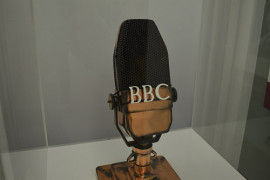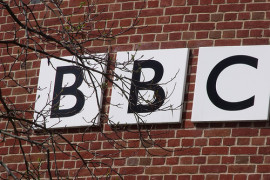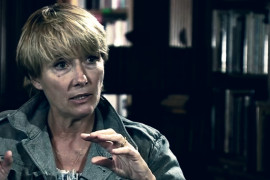Anti-Brexit group Britain Stronger in Europe has started its propaganda push with a £1.5m leaflet drop. It focuses – with hackneyed predictability – on threats that outside the Single Market, three million UK jobs will be at risk.
News-watch research shows that for years, BBC presenters and reporters have been allowing Europhiles to get away with these totally unfounded claims – devastatingly debunked by the Institute of Economic Affairs in March – virtually without challenge.
It is now becoming increasingly clear that nothing is going to change in BBC coverage in the run-up to the EU referendum.
Why? In effect, a Radio 4 programme broadcast on Thursday was a clear declaration, that the Corporation will be actively campaigning to amplify such messages – especially those about the Single Market.
Perhaps there is no surprise in this – after all an ex-BBC strategy chief, Carolyn Fairbairn, is now director-general of the fanatically Europhile Confederation of British Industry and has been declaring her referendum plans to the Guardian; and Sir Roger Carr, a former president of the CBI, is now deputy chairman of the BBC Trustees. The Corporation is so steeped in the importance of Brussels that it cannot see or think outside that bubble.
At what point, however, does biased BBC reporting tip over into being deliberately untrue?
According to many EU experts, that divide was crossed by the programme in question, an edition of the In Business slot which, in essence, on the basis of what can loosely be called unchallenged misinformation, purported to show what it claimed was the hugely negative impact on Norway of daring not to be a member of the Brussels club.
Hot on the heels of a similarly massively anti-Brexit programme by Carolyn Quinn – described here on The Conservative Woman – reporter Jonty Bloom conveyed to listeners without qualification or counter opinion a central untruth: that even though Norway was not in the EU, it was forced to follow EU directives, with potentially disastrous consequences. He suggested that being on the outside entailed vast expense for the Norwegian economy and meant it had no input into policy-making.
To illustrate this, he put centre stage in the programme an interview with a spokesman from an Oslo boiler manufacturer (called Oso, no doubt also chosen partly for its ardently ‘green’ agenda) which, it was alleged, had faced near disaster. Bloom said that the company had been doing very well until an EU directive covering tough changes in the regime around safety and ecological requirements of water-heating equipment suddenly appeared on the horizon.
He contended that the company had only been saved from ruinous new costs of up to £10m by last minute intervention by France, which had used its offices to secure an opt-out for Norway from the new regulations.
He larded the tale with dark warnings about other costs and pitfalls of being outside the Single Market – exactly in tune with the Britain Stronger in Europe leaflet and the direst warnings of the CBI. The full transcript of the programme is below.
Bloom’s programme opened with almost-reasonable interviews with Norwegian fishermen and farmers. He explained that opposition to the EU was rooted in these core economic areas.
But then the rot set in. According to website Leave HQ, what followed about the boiler-maker and Norway’s involvement with EU rules and the Single Market was ‘a pack of lies’, essentially because it most certainly does have influence, through its participation in the European Economic Area (EEA) and membership of EFTA (the European Free Trade Association).
The EU Referendum website explains:
‘In fact…right from the very start, the heating world exploded in outrage (against the proposed regulations). Not only did Norway object, but the issue was taken up by the Nordic Council of Ministers….It took until August 2013, more than three years after the draft regulations had been published, for the highly revised regulations, during which period the Norwegians were fully consulted.
‘To allow a claim that it was simply “blind luck” that prevented the original, more draconian proposals coming into force is a travesty. It simply isn’t true.’
There is not the space here to go into everything that Bloom got wrong – or about subsequent alleged highly dubious tampering with copy on the BBC website – but at its heart was the parading of a blatant untruth: that Europhiles from David Cameron downwards want us to believe: for countries outside the EU, and especially Norway, there is only darkness and despair.
There are dozens of different sources that Bloom could have approached to obtain a different and more realistic picture why up to 85% of Norwegians do not want to join the EU and why it is, in consequence, one of the richest countries in the world. One is Katherine Kleveland, leader of the Nei til EU campaign , who explains admirably here the advantages for her country of being outside the EU. To her, it is emphatically not a second best, involves no loss of national sovereignty or control, and allows Norwegians at every level a better and fuller say in trade negotiations because they are not funnelled through the EU.
This underscores that with EU affairs, nothing that the Corporation broadcasts can be trusted; everything is crafted with one end – to show that life outside the EU is, for the UK, and every other European country that is not yet a member, an unsustainable impossibility.
Transcript of BBC Radio 4, In Business, 21st January 2015, 8.30pm
ANNOUNCER: Norway’s relationship with the European Union is often held up as a potential model for the UK if we vote to leave the EU in the referendum that’s expected later this year. But what exactly is that model? Our business correspondent, Jonty Bloom, has been to Norway to find out.
JONTY BLOOM: Deep in the Arctic Circle where at this time of year the sun barely rises, this is the regional capital of the North of Norway. It’s a good two hour’s flight from Oslo, over hundreds and hundreds of miles of snow-covered mountains, icy islands, and long fjords reaching far inland. Tromso is right on the edge of Europe, closer to Moscow than Brussels and far further north than Iceland. It’s bitterly cold. I’ve come here because Tromso is at the heart of the Norwegian fishing industry. From here, trawlers venture deep into the stormy and freezing cold Barents Sea in search of cod, haddock, mackerel and prawns. During the 1994 referendum campaign on whether Norway should join the European Union, Tromso harbour filled with fishing boats all flying flags saying ‘Nei til EU’ – ‘No to the EU’ and since then, little has changed. So, did you used to take the boat out all did you er . . .
JAN ROGER LERBUKT: Yeah, I’ve been doing fisheries for many years.
JB: Jan Roger Lerbukt was almost born with webbed feet. I notice his massive hands bear the scars of many years at sea in rough dangerous conditions. He owns and runs one trawler, The Hermes – that spends up to five weeks at sea at a time, in fishing grounds that Norway owns and controls. Norway regards the EU’s Common Fisheries Policy with disdain. It has managed its fishing stocks successfully for years, and as a result, the fishing industry has been one of the bulwarks against entry to the EU. You used to go out with your father, did you?
JRL: Yeah, I started out, actually I was 10 years old, first time, but that was just for one week or something like that.
JB: And the most important man on board is the chef, I take it, is he?
JRL: Of course.
JB: Yes (laughs)
JRL: (laughs)
JB: I assume you had a vote in the ’94 referendum? Which way did you vote then?
JRL: I voted ‘no’.
JB: And why was that?
JRL: Based on the agreement and the deal we got with the EU at that time, and, and . . . and the whole question, I voted ‘no’. I think that was the best for . . . for the industry and Norway as a whole. Er, the situation for the stocks in the Barent Sea are very good now, and that comes, in my opinion, to the fact that we have been able, in Norway, to, have legislations and regulations which has been able to build the stocks up, and that’s vital to us, of course, because this is . . . this is for the future, it’s not a business for today. It’s, it’s for the future to, to keep the stocks in a, in a good condition, to be able to harvest of them (sic) for, for many, many years to come. For my children, for their children, for the future – it’s food.
JB: And what is it that you would fear about being in the EU?
JRL: Loss of control. Loss of control of the fisheries, of the stocks of the . . . the regulations, depleting the resources. That’s what I would fear. If that should be the result, I will always vote ‘no’.
(mournful music)
JB: Although Tromso is remote, it’s still the regional capital. In fact, once called the Paris of the North, it’s home to the Arctic Philharmonic but I wanted to get out of town to visit one of the many fish farms that use the pure icy water of the local fjords to rear millions of salmon. To get there takes another three hours . . . by ferry and then by car. Across the island of Senja, on snow-covered roads through deep mountain valleys, until you finally reach the coast. And then it’s another half an hour by boat to the fish farm itself. I’m on the deck of a support vessel about two or 3 miles down Bergsfjord in North Norway. It’s permanent night at this time of the year round here, so there’s just enough twilight to see the huge mountains which surround us on nearly every side. Absolutely covered in snow and ice. And the reason we’re here is just in front of us, huge pens of an enormous salmon farm, there’s something like a million and a half salmon right in front of me, they love this environment, I can’t say I do, I’ve got about four layers on, including a complete emergent suit, but it is something like minus 13 or minus 15 out here at the moment, and I’ve found myself suddenly . . . willing to pay considerably more for a salmon steak at my local supermarket than I was previously. This is a, a vital Norwegian industry which is deeply affected by the country’s relationship with the European Union. Fredd Wilsgaard owns and runs this fish farm.
FREDD WILSGAARD: It’s freezing and they are working, it’s okay it’s part of the game, it’s okay.
JB: With a dry sense of humour and a twinkle in his eye, Fredd has a remarkable resemblance to George Clooney. He even joked about it, but on the subject of the EU, he’s deadly serious. Did you vote in the ’94 referendum?
FW: Yes I did.
JB: Can I ask you how you voted then?
FW: Yes you can. I voted, ‘no’. As a salmon farmer, I voted ‘no’. And if you look around, you can see . . . there are some sites, there are some farmers living here, and we have a little industry, mining here in (word unclear) the fisheries, you can see (fragments of words, or words unclear) you can see three fish boats, fishing herrings, and this community cannot survive, if you don’t pull it all together – fisheries, industry, farming. And the reason why I, I voted ‘no’ in ’94 was . . . that I was afraid of the consequences for the fisheries. And without the fisheries we can’t do this society alone, as farmers, but I’m not sure today that I would vote ‘no’ again.
JB: To understand why Fredd is thinking again about how he would vote, I visited the factory he owns a few miles down the road.
FW: This is (word or words unclear) gallery, and you can see the fish . . .
JB: (words unclear) coming down, in towards the holding tank, I think.
FW: Yes it is.
JB: And they’re immediately, four at a time, they’re stunned and . . . and then killed.
FW: Stunned and slaughtered, yes.
JB: Every knock you hear, which sounds rather like a squash ball being whacked against a wall, is a salmon being stunned and killed. 14,000 a day are sucked out of the holding pens and within two minutes gutted, inspected and packed in ice. Now, the thing that strikes me about this is, I mean, it’s an amazingly automated process, and you’ve got lots of people in here checking and everything, but all you’re doing is killing and cutting the fish, and then putting them into a box whole.
FW: Yes.
JB: What would you like to do with them?
FW: A small amount of the fish that we are processing in this plant is taken over to the next plant to make fillets but I would like to do a lot more, more fillets and, and I would like to smoke some salmon, and I would like to . . . do more, make it finish so that you could go to the store and . . . pick it up and go home and eat it.
JB: So you could do ready meals and prepared fish with sauce, and all sorts of stuff.
FW: Yes, or we could do ready meals.
JB: And why don’t you do more of that?
FW: A part of it is the taxes that we’ve got on the product, the more finished we do it, so er . . . that’s the price for being outside the Union.
JB: Norway doesn’t process is much of the fish it ships to the EU as it would like. The tariffs are too high. Just 2% on gutted fish, but up to 13% unprocessed. As a result, its ships its fish to Denmark and Poland where they are turned into ready meals. Norway is losing their jobs that involves, and the higher profits it would bring.
(mournful music)
JB: That helps explained why Fredd voted to stay out of the EU in 1994, but now he’s part of a small minority who would probably vote to join. Quite a shift for quite a traditional industry. But that’s not going to happen. Another referendum is not on the agenda and even if it were, a large majority of Norwegians, around 70% would vote against it again, according to the polls. One reason for that can be found in a cowshed, more than a thousand miles south of Fredd’s salmon farm on the outskirts of Oslo. The agricultural lobby in Norway is big and powerful.
TRON RAYOSTAR: See, think now it’s time for milking, so you go inside here, and then, er, the computer now, now it’s ready, time for milking or just feeding and then, open the door (words unclear) for feeding (words unclear) for milking.
JB: And how does the computer know that?
TR: Er . . . she has this number here . . .
JB: Ah, she has a computer chip on her neck.
TR: Yes, yes.
JB: Tron Rayostar (phonetic) is a farmer, he says he knows every one of his 40 dairy cows, but Tron has another important job – he’s President of the TINE Cooperative, made up of 15,000 farmers which dominates the dairy industry in Norway. How is the dairy industry at the moment, how are . . . things for you?
TR: ’15 will be a very good year for the farmers, yeah. For the milking production in Norway, it’s nice time now. So that’s the big difference from Europe.
JB: Yes it is, isn’t it?
TR: Yes, and that’s the Norwegian politics, to make that possible.
JB: Because in the rest of Europe prices are falling, but . . .
TR: Yes.
JB: . . . here they’re still pretty good aren’t they?
TR: Yes. They are stable or rising a little bit.
JB: Norway looks after its farmers. There will be many a British dairy farmer who would like a price rise, and yet milk in Norway is already far more expensive than it is in the UK. Across the farmyard there’s a beautiful house, resting on the edge of snow-covered fields with wood-burning stoves, underfloor heating and effortless Scandinavian style. It’s a picture postcard pretty. In the farmhouse, we warmed up and tried some of Tron’s wife’s home-made biscuits. We talked to him in a mix of English and Norwegian with his TINE colleague, Bjorn Strom (phonetic) translating and chipping in. Just as Norway’s fishing industry wants nothing to do with the EU’s Common Fisheries Policy, its farmers want nothing to do with its Common Agricultural Policy. That still accounts for 40% of the EU’s budget and has often been criticised for subsidising farmers and protecting them from international competition, while forcing up food prices. But what, I wanted to know . . . was it about the Common Agricultural Policy which would not work for Norwegian farmers?
BJORN STROM: He says that in Norway we have very high costs, and there are also climatic conditions that is very difficult. We are, for most of the country, nearer to the North Pole than to Rome, and that means that we need a differential agricultural policy.
JB: And how is Norwegian agriculture protected against imports.
BS: We have tariffs, which are protecting the rich agricultural producers. And . . . there was also a quota system for import on some basic Norwegian products, which can be imported.
JB: So, I think the famous example is cheese, is it, foreign cheeses get quite high tariff when they come into Norway? How high is that, do you know?
BS: Some cheeses are in fact, er, free for imports inside the quota, some cheeses have a lower tariff than others, and so we have a few cheeses with very high tariffs, about 270%.
JB: Yes, there are tariffs as high as 270% on some cheeses imported into Norway. The country doesn’t like the Common Agricultural Policy, because it’s nowhere near as generous to the EU’s farmers as Norway’s government is to Norwegian ones. No wonder the national anthem is titled, ‘Yes, We Love this Country.’
(Norwegian national anthem)
JB: In the main square in the centre of Oslo, the iceskating rink is busy. It’s in a prime spot, between the Parliament and the Royal Palace. There’s snow on the ground and lights in the trees, and everywhere you look there are expensive international stores. This is an outward-looking, very successful and prosperous country. And for many people it illustrates what is possible for a European country if it’s outside the European Union. A short walk from the ice rink, and an office on the quite square, I discovered that although fishing and farming are totally outside the EU, the rest of the economy is surprisingly well-integrated. So chart 14.8 is . . .
ULF SVERDRUP: Basically showing the economic integration, between different European countries and the internal market.
JB: Ulf Sverdrup, director of the think-tank, the Norwegian Institute of International Affairs, was showing me a chart I think he knew would surprise me. It shows how much trade certain countries do with the European Union.
US: And if you include Norway in that . . . listing of countries, you find that Norway is among the . . . economies who are most integrated and dealing the most with the European market.
JB: So actually, you’re about, Norway on its own is about the fourth most integrated country, if you look at imports and exports.
US: Yes.
JB: Of all the countries of (fragment of word, unclear) of Europe. And the UK is the least.
US: Yeah.
JB: And yet, you’re not a member and we are.
US: Yeah.
JB: (laughs)
US: (laughs)
JB: In part, that huge trade with the EU is because Norway has something that the countries of the European Union desperately need: huge supplies of oil and gas from a safe, reliable and friendly neighbour. But that also means that Norway is closely tied to the EU. Ulf should know – the chart comes from a huge report on Norway’s relationship with the European Union he helped to write, called ‘Outside and Inside’
US: Formally speaking, Norway is outside, it’s not a member of the EU, but if you look into the details, look into the agreements, we find that Norway is much more inside than outside. It’s more fair to say that we are three quarters inside, rather than an outsider.
JB: Norway may not be in the EU, but it has signed up for an awful lot of EU projects, and it’s part of the Schengen zone, which currently means there’s free movement into and out of Norway for most EU citizens, and it cooperates and justice, crime and defence. The fisheries and farming sectors are outside of the EU, but the rest of the economy is pretty much part of the single market, just as Germany, France and the UK are. So why has Norway voted ‘no’ to EU membership, but become so closely tied?
US: Some Norwegian voters wanted to preserve sovereignty, and national democracy. At the same time they also wanted to . . . protect economic interests, so you have to find a balance between these different things and . . . from 1994, when we had the referendum, on every occasion politicians faced with a choice have opted for more European integration rather than less.
JB: But why then have the politicians and the business leaders failed to convince voters, the majority of Norwegians, that you may as well join?
US: Formal membership is often seen as a kind of . . . making big leaps, kind of changing from one state to another basically, whereas these small, incremental adjustments has not been so hard to sell.
JB: So what is it exactly that has persuaded the Norwegians to stay close to the European Union? The answer, it seems, is access to the single market. That’s worth a small fortune to Norway. As a country of under 5 million people, it gives Norway access to a population of potential customers a hundred times larger. But that access doesn’t come cheap. Norway pays hundreds of millions of euros a year to the EU.
US: The EU is quite a tough negotiator (short laugh) yeah, so we pay more or less . . . I think if you rank it, it’s sixth or seventh, the biggest net contributor, if you were to compare. Pay more per capita than the Finns and the Danes.
JB: It’s not much of a saving then? If you’re, if you’re not in then is it?
US: No, but you have to remember that Norway’s association with the EU is not a model carefully decided, it’s more of an accident, a series of accidents that happened.
JB: The single market is more than just a free trade zone. It regulates and enforcers rules and standards that in theory guarantee the free movement of goods, services, capital and people. That means a company can sell its goods in any EU member state as easily as in its own country. But the rules that make that possible are written in Brussels and Strasbourg. It’s almost 9 o’clock in the morning now and it’s still pretty dark outside. Er, but it’s a lovely scene as you come out from Oslo’s Central Station, past all the hills covered with trees and snows, and the odd ski track. There’s warm looking lights on everywhere, but it’s minus 10 outside. I’m on my way to meet a company that’s having real problems with Norway’s relationship with the EU. Although there are lots of benefits in Norway not being in the European Union, there are of course costs. I was met off the train by Sigurd Braathen, the managing director of OSO hot water – a family-owned maker of central heating boilers for private and business properties. The factory is almost completely automated with dozens of robots.
SIGURD BRAATHEN: So this is where we marry the parts, we marry the top and the bottom on the cylinder.
JB: Many of the machines are brand-new. They’ve been installed at huge cost, for one simple reason. Sigurd woke up one morning a couple of years ago to find a new EU directive on energy efficiency and environmental standards was threatening half his product range.
SB: Yeah, that’s about it, we woke up one day and after doing the calculations, and the different way of . . . of calculating the ratings for our products, and we suddenly saw that, you know our [word unclear ‘products’?] will be useless. And it just happened overnight, we felt trampled upon I would say , especially since we can’t affect the decision, it was a difficult period to find out what to do, but we just need to get on with it and . . . and find solutions to the legislation as it was back then.
JB: The European Union had decided to introduce new rules, which massively favoured gas boilers over electric ones. But Norway’s electricity is almost totally green, it comes from hydroelectric power plants. Because Norway has little say in EU rules, the company was stymied, and thought it would have to invest £10 million in new plant to meet new standards. At the last moment, France and Finland had the directive watered down – they produce quite a lot of green electricity as well, and thought the rules would hurt their boilermakers. That lucky break saved OSO £5 million.
SB: It’s probably just dumb luck that we ended up with legislation that allows us to maintain most of our product range.
JB: If you had to get rid of half your product range, what would’ve happened to this factory?
SB: Well, the factory would have er . . . been in desperate need of investment, as a family business we would have been forced to borrow a lot of money, I think, we don’t like that, we like to have a safe business, to try not to have too much in debt, if we are to adapt to the way it was originally, then I’m sure it would’ve meant another £5 million investment, and for us that’s huge, when our turnover is about €50 million.
JB: As it was, they still had to find £5 million to spend on new equipment – money SIgurd would’ve liked to have spent on entering new markets. What really surprised me about this story was that if OSO hadn’t changed its products to suit the new EU directive, it wouldn’t just have been banned from selling its hot water tanks in the EU, it wouldn’t have been able to sell them in Norway either, because EU single market rules apply in Norway as much as in Germany, France or Great Britain. Now, Norway is different from the UK, it’s a much smaller economy and the UK might be able to negotiate a better deal than Norway gets if it leads the EU. But Norway is small fry in EU terms and it accepts what is sometimes called ‘rule by fax’ – the story, probably apocryphal, is that somewhere in a Norwegian government office there’s a fax machine, every day, Norwegian civil servants are supposed to sit around it waiting for the latest pages of EU rules from Brussels to spew out, so they can quickly be passed into Norwegian law.
LARS HEIM: Yes, hello, welcome.
JB: Hello, I’m Jonty Bloom.
LH: Lars Heim (phonetic)
JB: Lars Heim is the undersecretary for industry. He’s in charge of that famous fax machine. Minister, so the first question is: where exactly is this fax machine when Norway receives all the . . . the new laws and . . .
LH: (laughs)
JB: . . . regulations from Brussels.
LH: We don’t have a . . . a fax machine, but we get all our er . . . a lot of new legislation from EU and er, Norway being a part of the inner market, er, internal market we have to . . . apply and make them a part of Norwegian legislation as well.
JB: In fact, experts I spoke to said it was not so much rule by fax machine, it’s more like the Norwegian government comes into work every day, turns on its computer and finds a new software update ready to load. So, has the government ever refused to implement a law, I asked. The previous government, the Minister said, had decided it would resist changes to the postal system, but when the new administration got in, they waved it through, believing it wasn’t worth the fight. There are other developments, however, they watch nervously.
LH: Of course, if the EU and the United States reach a free trade agreement, that would impact Norway strongly, because we are part of the internal market but we will not be part of that agreement, and that of course will open up whole new situation that we have to decide what would serve Norway’s interests best in, in that kind of situation.
JB: So what would the options be?
LH: We don’t know yet. We keep our options open, but of course we had to consider should we try to . . . erm . . . be a part of the agreement, should we try to be a bilateral agreement with the United States? Should we try to find another kind of solution? But we follow it closely, we talk to both parties, both in the United States and the European Union, and we try to monitor the situation as closely as we can, not being a member, and we also try to evaluate what could the possible consequences be for Norwegian industries and businesses.
JB: Could you just ask to have exactly the same terms and conditions with the United States?
LH: Of course we can ask, but I don’t know if that’s feasible.
JB: It does illustrate the kind of issue that . . . if you want to be outside the EU, but have complete access to . . .
LH: Hmm.
JB: . . . the EU, you have to accept the EU’s rules.
LH: Hmm.
JB: Of course, many in Norway’s business community would like to have a say on those rules, for obvious reasons.
KRISTIN LUND: Mostly business just have to adapt, I mean, often there’s no other way around it.
JB: Kristin Lund is the director general of the Norwegian Federation of Enterprise, the NHO – the main organisation for employers in Norway. I asked her why Norway doesn’t try to renegotiate the terms of its relationship with the EU.
KL: Frankly, I don’t think we would have gotten those same terms today, and we also realise that, so we, we stick onto and hang onto that agreement.
JB: So you think the terms now would be worse?
KL: Yes.
JB: And Norway pays a lot to maintain close ties with the EU. It is a rich country, it has immense benefits of huge amounts of North Sea oil and gas, which it can use to help an economy of under 5 million people. It’s cautioned by that oil and gas, and by the sovereign wealth fund it’s built up with the proceeds. That makes it pretty unique in European terms, but it knows those riches won’t last forever.
KL: Let’s put it this way: that the fact that we’ve had such a successful oil and gas sector has made our economy grow and be very healthy and, and er . . . prosperous over the last two decades, and I think (inhales) . . . going into a new era now, where . . . where we can not rely to the same degree on that sector I think we will be faced with more of, let’s say, the economic realities that’s hit the rest of Europe. And I think . . . that’s going to make us more like the rest of Europe. You know we’ve been . . . in a bit of a different situation, and I think that has cautioned a lot different effects, economically, for Norway. And maybe this is not exactly raised some of these questions and issues to the degree it otherwise would have.
JB: Still there is absolutely no evidence that Norway wants to join the EU. Over many years opinion polls have shown that there is consistently been a large majority against entry. And it’s not even on the political agenda. Certainly, all the Norwegians I spoke to were opposed.
VOX POP MALE: In ’94 I vote ‘no’, I was very afraid that we will lose oil and the fishery to the European Union. It’s still ‘no’ for my sake, (word or words unclear) for sure.
VOX POP FEMALE: I like that we have control over our money. Like, I want everything to be our decision, so I want us to make the decision, even if it’s the same one as we would have made in the EU, but I wanted to be completely our decision.
VOX POP MALE 2: It cost a lot to stay outside the Union, but we think it’s worth it, because still we have the natural resources for ourself (sic) the oil and the fish.
JB: [sombre sounding bell rings throughout next section] Norway is not a member of the European Union and it is a rich and successful country. The UK could be like that too. But Norway does have access to the single market and is very intricately tied to the EU. It is an arrangement that many in Norway seem perfectly happy with, but if the UK were to follow the Norwegian model that wouldn’t mean a totally clean break from the European Union.











